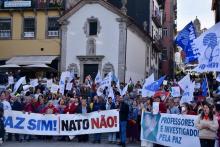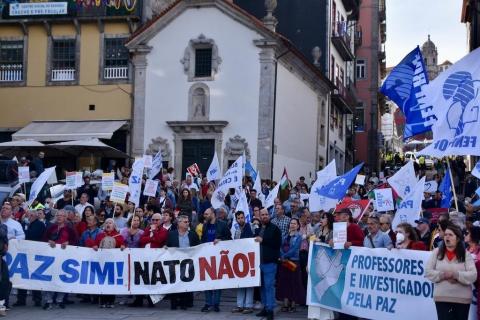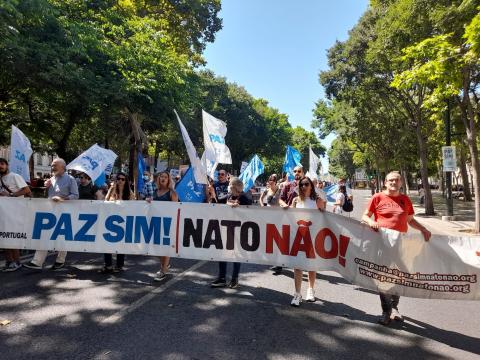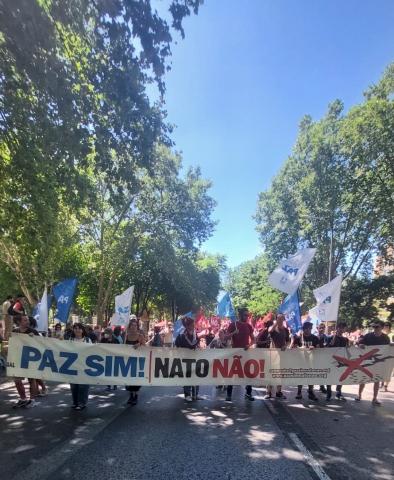Yes to Peace! No to NATO! CPPC in Madrid, Lisbon and Porto
The Portuguese Council for Peace and Cooperation participated in the demonstration «No to NATO | No to wars | For Peace | Out the bases | No to the militarist budget” which took place in Madrid on June 26.
The CPPC took part in the demonstration, parading with the Yes to Peace! No to NATO! banner and its flags, along with other member organisations of the World Peace Council (WPC).
This demonstration was part of a series of initiatives that took place in Madrid against the NATO Summit that was held on June 29 and 30.
The CPPC accepted the invitation of the Spanish Committee for the Defence of Solidarity and the Struggle for Peace (CEDESPAZ) not only to participate in this demonstration, but also in the panel on the theme: «Alternatives for a collective and non-militarised security», within the context of the No to NATO Summit, which took place on June 24 and 25, also in the Spanish capital.
In his speech Eduardo Lima, a member of the National Board of the CPPC, reaffirmed, among other aspects, the rejection of the path of militarism and war, the need for the dissolution of political-military blocs, hence of NATO - namely giving continuity to the "Yes to Peace! No to NATO!" campaign – and the importance of building a collective security system based on the principles of the United Nations Charter.
And so, the CPPC joined the appeal, together with CEDESPAZ and the WPC, to participate and support the actions that would be carried out against NATO in Madrid, launched at the meeting of WPC member organisations from the European region, held
in November 2021, in Gaia.
In Portugal, the CPPC, together with other entities, was engaged in holding parades in Lisbon, on June 25, and in Porto, on June 29, joining the Appeal "Yes to Peace! No to War and to the arms race!" signed by dozens of Portuguese personalities and
organisations, and where the CPPC participated, also giving expression to the campaign "Yes to Peace! No to NATO!"
Intervention of the CPPC in the panel on the theme: «Alternatives for a collective and non-militarised security»
Dear friends,
First and foremost, please allow me, on behalf of the Portuguese Council for
Peace and Cooperation, to begin by expressing our warmest greetings to all
those present and, specially, to CEDESPAZ, whom we thank for the invitation to
participate in this important initiative. rejecting the path of militarism and war,
rejecting NATO and affirming peace, friendship and cooperation with all
peoples.
The counter-summit we are holding here takes place in a context of worsening
interference and aggression, of an arms race, of war, where NATO's militaristic
and aggressive objectives stand out. A reality that highlights the heightened
importance of this counter-summit. We consider fundamental the convergence
of all those who defend and affirm peace and disarmament as the alternative
path to war, as the path that truly serves the interests of the peoples of Europe
and the entire world.
The situation in Europe and in the world is characterised by an escalation of
war, militarism, arms race, which poses serious dangers that threaten
Humanity. This has been a path in which the United States of America and its
allies, including NATO and the EU, have assumed a leading role.
They are mainly responsible for the increase in military spending, for the race
for new, even more sophisticated and destructive weapons – namely nuclear
weapons – for the escalation of interference, threats, provocations,
destabilisation operations, imposition of sanctions and blockades and military
aggressions against the peoples and countries that dare to assert their
sovereignty and their rights, for disregarding the principles of the United Nations
Charter and international law; in short, they are those mainly responsible for a
dangerous situation that can lead to the beginning of a conflict of great and
serious consequences for Humanity.
Contrary to what some claimed, the new US administration, led by Biden,
despite tactical and circumstantial differences, essentially maintained its
strategy of seeking to impose US global hegemony, exemplified in its efforts to
expand military alliances and partnerships beyond NATO, such as AUKUS or
QUAD, for the continuation of aggressions and the imposition of blockades, for
the intensification of the policy of confrontation against China and Russia,
pinpointed as the strategic adversaries of the US.
The current situation in Eastern Europe testifies precisely to the intensification
of this policy of confrontation: decades of NATO advance towards the borders
of the Russian Federation – with bases, forces, naval fleets, military exercises –
culminated in the escalation of the conflict that is currently taking place. It is
urgent to reverse the course of provocation, militarisation and confrontation that
has been going on for a long time in that region.
And contrary to what is imperative for the construction of peace, in Europe and
in the world, we have been witnessing the militarisation of the European Union
with the "Permanent Structured Cooperation"(PESCO), the creation of a so-called "European Defence Fund" the implementation of a programme for the
development of the arms industry, or with the so-called “battle groups” of the
EU, which implies not only the use of more EU financial resources for its
warmongering policy, but also the increase in military spending in each of the
countries that comprise it.
The militarisation of the EU and the creation of the so-called “European army” is
a process that – not without contradictions – converges with US foreign policy,
with the EU assuming itself as the European pillar of NATO and its militarisation
as a complement to this aggressive political-military bloc.
At the beginning of this year, steps were already taken in this direction with the
adoption of the so-called "strategic compass" of the European Union, that is, the
proposal of a strategic concept that intends to relaunch the autonomous
strategic capacity of the EU's military intervention and that will be articulated
with the objectives defined in NATO's next strategic concept, which will be
adopted during the Summit to be held here in Madrid.
The militarisation of the European Union, in coordination with NATO, is not a
step towards the defence of peace, on the contrary, it represents more
militarism, more military spending, increasing interventionism and the threat of
war.
The militarisation of the EU, whether complementary to NATO, constitutes a
threat to Peace that has to be stopped To this end, the information and
mobilisation of all those who defend peace are crucial.
This coming NATO Summit intends to enhance the path followed until today At
stake will be the significant increase in military spending by NATO members, its
enlargement to Sweden and Finland and the continuation of the war in Ukraine,
inserted in the US Administration's strategy of attrition of Russia. At the same
time, an attempt is made to shut the path of negotiation and dialogue with a
view to a negotiated solution to the conflict.
Portugal's association with NATO's aims and the militarisation of the EU means
yet another step in the subordination and conditioning of its foreign policy to
NATO and the EU.
It should be recalled that the Portuguese fascist dictatorship was one of the
founding members, in 1949, of NATO, which has always been an instrument of
war and domination to serve the economic, political and geo-strategic interests
and objectives of the United States of America.
But the end of NATO and the construction of a collective security system based
on the United Nations Charter is also a constitutional imperative that any
Portuguese government should pursue.
In its article 7, the Constitution of the Portuguese Republic, itself an
achievement of the April Revolution, states that “Portugal advocates the
abolition of imperialism, colonialism and any other forms of aggression,
domination and exploitation in relations between peoples, as well as general,
simultaneous and controlled disarmament, the dissolution of political-military blocs and the establishment of a system of collective security, with a view to
creating an international order capable of ensuring peace and justice in
relations between peoples. ”
It is for the construction of an alternative path to war, of peace and solidarity
and friendship among peoples that today's counter-summit and tomorrow's
demonstration are so important, showing that the forces upholding peace are
united and determined in denouncing and mobilising against militarism, war and
all forms of aggression in international relations.
Two parades in defence of peace are scheduled for Portugal - today, June 25,
in Lisbon, and on the 29 th . in Porto - promoted by several personalities and
organisations and which will be two important moments of defence of peace,
where a clear appeal will be made to the Portuguese authorities so that “they do
not contribute to the escalation of confrontation and war, but rather to the
creation of conditions for dialogue that ensure the establishment of a climate of
trust, with a view to creating a system of collective security, an international
order capable of ensuring peace and justice in relations among peoples.”
Friends,
It is urgent to:
- demand an end to the militarisation of the EU and its interference missions in
various countries;
- say no to NATO and demand its dissolution;
- say no to the arms race and demand a cut in military spending and the
abolition of nuclear weapons and other weapons of mass destruction;
Continuing the campaign "Yes to Peace! No to NATO!", started in 2010, the
CPPC will continue persistently, converging with all organisations and activists
that defend the cause of Peace, to promote actions against the militarisation of
the EU and NATO.
It has never been so important to uphold the principles of the United Nations
Charter and international law, the right of peoples to self-determination, national
sovereignty and independence, the peaceful settlement of international
conflicts, universal, simultaneous and controlled disarmament, the dissolution of
political-military blocs, cooperation among peoples and countries for the
establishment of a system of collective security, with a view to creating a new
international order of peace and social progress.
It is urgent to strengthen the struggle for Peace and mobilise all peace-loving
forces to defend these principles and aspirations – you can count on the CPPC
for this fair and necessary struggle.
-------/
Sim à Paz! Não à NATO!
- CPPC em Madrid, em Lisboa e no Porto
O Conselho Português para a Paz e Cooperação participou na manifestação «Não à NATO | Não às guerras | Pela Paz | Fora as bases | Não ao orçamento militarista» que se realizou em Madrid, no passado dia 26 de Junho.
O CPPC integrou a manifestação, desfilando com o pano «Paz sim! NATO não!» e as suas bandeiras, junto com outras organizações membro do Conselho Mundial da Paz (CMP).
Esta manifestação integrou-se num conjunto de iniciativas que tiveram lugar em Madrid contra a Cimeira da NATO que se realizou nos dias 29 e 30 de Junho.
O CPPC aceitou o convite do Comité Espanhol de Defesa da Solidariedade e de Luta pela Paz (CEDESPAZ) não só para participar nesta manifestação, como no painel sobre o tema «Alternativas para uma segurança colectiva e não militarizada», no quadro da Cimeira Pela Paz Não à NATO, que se realizou nos dias 24 e 25 de Junho, igualmente na capital espanhola.
Na sua intervenção (ver abaixo), Eduardo Lima, membro da Direção Nacional do CPPC, reafirmou, entre outros aspectos, a rejeição do caminho do militarismo e da guerra, a necessidade da dissolução dos blocos político-militares, logo da NATO – nomeadamente dando continuidade à campanha "Paz sim! NATO não!"– e a importância da construção de um sistema de segurança coletiva assente nos princípios da Carta das Nações Unidas.
Deste modo, o CPPC associou-se ao apelo para, junto com o CEDESPAZ e o CMP, participar e apoiar as acções que seriam realizadas contra a NATO em Madrid, lançado na reunião das organizações membro do CMP da região Europa, realizada em Novembro de 2021, em Gaia.
Em Portugal, o CPPC empenhou-se, em conjunto com outras entidades, na realização de desfiles em Lisboa, no dia 25 de Junho, e no Porto, no dia 29 de Junho, associando-se ao Apelo "Paz sim! Guerra e corrida aos armamentos não!" subscrito por dezenas de personalidades e organizações portuguesas, e onde o CPPC participou dando igualmente expressão à campanha "Sim à Paz! Não à NATO!"
Intervenção do CPPC no painel «Alternativas para uma segurança colectiva e não militarizada»
Caros amigos,
Antes de mais, permitam-me que, em nome do Conselho Português para a Paz e Cooperação, comece por expressar as nossas mais calorosas saudações a todos os presentes e, em particular, ao CEDESPAZ, a quem agradecemos o convite para participarmos nesta importante iniciativa de rejeição do caminho do militarismo e da guerra, de rejeição da NATO e de afirmação da Paz, da amizade e da cooperação com todos os povos.
A contra-cimeira que aqui realizamos decorre num quadro de agravamento de ingerências e agressões, da corrida aos armamentos, da guerra, onde sobressaem os objectivos militaristas e agressivos da NATO. Uma realidade que evidencia a importância redobrada desta contra-cimeira. Consideramos fundamental a convergência de todos os que defendem e afirmam a paz e o desarmamento como o caminho alternativo à guerra, como o caminho que serve verdadeiramente os interesses dos povos da Europa e de todo o Mundo.
A situação na Europa e no Mundo é caracterizada por uma escalada da guerra, do militarismo, da corrida aos armamento, o que coloca sérios perigos que ameaçam a Humanidade. Este tem sido um caminho onde os Estados Unidos da América e os seus aliados, incluindo da NATO e da UE, têm assumido um papel central.
São eles os principais responsáveis pelo aumento das despesas militares, pela corrida a novos armamentos, ainda mais sofisticados e destrutivos – nomeadamente armas nucleares – pela escalada de ingerência, ameaças, provocações, operações de desestabilização, imposição de sanções e bloqueios e agressões militares contra os povos e países que ousam afirmar a sua soberania e os seus direitos, pelo desrespeito dos princípios da Carta das Nações Unidas e do direito internacional; em suma, são eles os principais responsáveis por uma perigosa situação que pode levar ao início de um conflito de grandes e graves consequências para a Humanidade.
Ao contrário do que alguns proclamavam, a nova administração dos EUA, presidida por Biden, apesar de diferenças tácticas e circunstanciais, manteve no essencial a sua estratégia de procurar impor a hegemonia mundial dos EUA, exemplificada nos seus esforços para expandir alianças e parcerias militares para além da NATO, tais como a AUKUS ou a QUAD, pela continuação de agressões e imposição de bloqueios, pela intensificação da política de confrontação contra a China e a Rússia, identificados como os adversários estratégicos dos EUA.
A situação que se vive hoje no Leste Europeu testemunha precisamente a intensificação desta política de confrontação: décadas de avanço da NATO até às fronteiras da Federação Russa – com bases, contingentes, frotas navais, exercícios militares – culminaram na escalada do conflito que hoje se verifica. É urgente inverter o rumo de provocação, militarização e confrontação que há muito se vive naquela região.
E contrariamente ao que é imperativo para a construção da paz, na Europa e no Mundo, temos vindo a constatar a militarização da União Europeia com a "Cooperação Estruturada Permanente" (PESCO), a criação de um denominado "Fundo Europeu de Defesa", a implementação de um programa para o desenvolvimento da indústria de armamento, ou com os denominados “grupos de combate” da UE, o que implica não só a utilização de mais meios financeiros da UE para a sua política belicista, como o aumento das despesas militares em cada um dos países que a integra.
A militarização da UE e a criação do chamado “exército europeu” é um processo que – não sem contradições – converge com a política externa dos EUA, assumindo-se a UE como o pilar europeu da NATO e a sua militarização como complementar a este bloco político-militar agressivo.
No início deste ano, foram já dados passos neste sentido com a aprovação da chamada “bússola estratégica” da União Europeia, ou seja, a proposta de um conceito estratégico que pretende relançar a capacidade estratégica autónoma de intervenção militar da UE e que se articulará com os objectivos definidos no próximo conceito estratégico da NATO, que irá ser adoptado durante a Cimeira que terá lugar aqui em Madrid.
A militarização da União Europeia, em coordenação com a NATO, não constitui um passo na defesa da paz, antes pelo contrário, representa mais militarismo, maiores despesas militares, crescente intervencionismo e ameaça de guerra.
A militarização da UE, complementar ou não à NATO, constitui uma ameaça à Paz que urge travar. Para tal é determinante o esclarecimento e a mobilização de todos os que defendem a paz.
A próxima Cimeira da NATO pretende acentuar o rumo seguido até hoje. Em causa estarão o significativo aumento das despesas militares dos membros da NATO, o seu alargamento à Suécia e à Finlândia e o prolongamento da guerra na Ucrânia, inserido na estratégia da Administração norte-americana de desgaste da Rússia. Ao mesmo tempo que se procura manter fechado um caminho de negociação e diálogo com vista à solução negociada do conflito.
A associação de Portugal aos objectivos da NATO e à militarização da UE significa mais um passo na sua subalternização e condicionamento da sua política externa à NATO e à UE.
Recorde-se que a ditadura fascista portuguesa foi uma das fundadoras, em 1949, da NATO, que é desde sempre um instrumento de guerra e dominação ao serviço dos interesses e objetivos económicos, políticos e geo-estratégicos dos Estados Unidos da América.
Mas o fim da NATO e a construção de um sistema de segurança coletiva assente na Carta das Nações Unidas é, também, um imperativo constitucional que qualquer governo português deveria prosseguir.
No seu artigo 7.º, a Constituição da República Portuguesa, ela própria uma conquista da Revolução de Abril, consagra que “Portugal preconiza a abolição do imperialismo, do colonialismo e de quaisquer outras formas de agressão, domínio e exploração nas relações entre os povos, bem como o desarmamento geral, simultâneo e controlado, a dissolução dos blocos político-militares e o estabelecimento de um sistema de segurança coletiva, com vista à criação de uma ordem internacional capaz de assegurar a paz e a justiça nas relações entre os povos.”
É pela construção de um caminho alternativo à guerra, de paz e solidariedade e amizade entre os povos que a contra-cimeira de hoje e a manifestação de amanhã são tão importantes, mostrando que as forças defensoras da paz estão unidas e determinadas na denuncia e mobilização contra o militarismo, a guerra e todas as formas de agressão nas relações internacionais.
Para Portugal estão marcados dois desfiles em defesa da paz – hoje, dia 25 de junho, em Lisboa, e dia 29 no Porto – promovidos por diversas personalidades e organizações e que serão dois importantes momentos de defesa da paz, onde será feito um claro apelo às autoridades portuguesas para que “não contribuam para a escalada de confrontação e de guerra, mas sim para a criação de condições de diálogo que garantam o estabelecimento de um clima de confiança, com vista à criação de um sistema de segurança coletiva, a uma ordem internacional capaz de assegurar a paz e a justiça nas relações entre os povos.”
Amigos,
É premente:
- exigir o fim da militarização da UE e das suas missões de ingerência em diversos países;
- afirmar não à NATO e exigir a sua dissolução;
- dizer não à corrida aos armamentos e exigir a redução das despesas militares e a abolição das armas nucleares e de outras armas de destruição massiva;
Continuando a campanha "Sim à Paz! Não à NATO!", iniciada em 2010, o CPPC continuará persistentemente, convergindo com todas as organizações e activistas que defendem a causa da Paz, a promover acções contra a militarização da UE e a NATO.
Nunca foi tão importante defender os princípios da Carta das Nações Unidas e do direito internacional, o direito dos povos à autodeterminação, a soberania e a independência nacional, a solução pacífica dos conflitos internacionais, o desarmamento universal, simultâneo e controlado, a dissolução dos blocos político-militares, a cooperação entre os povos e países para o estabelecimento de um sistema de segurança colectiva, com vista à criação de uma nova ordem internacional de paz e progresso social.
É urgente reforçar a luta pela Paz e mobilizar todas as forças amantes da paz para defender estes princípios e aspirações – podem contar com o CPPC para este justo e necessário combate.







